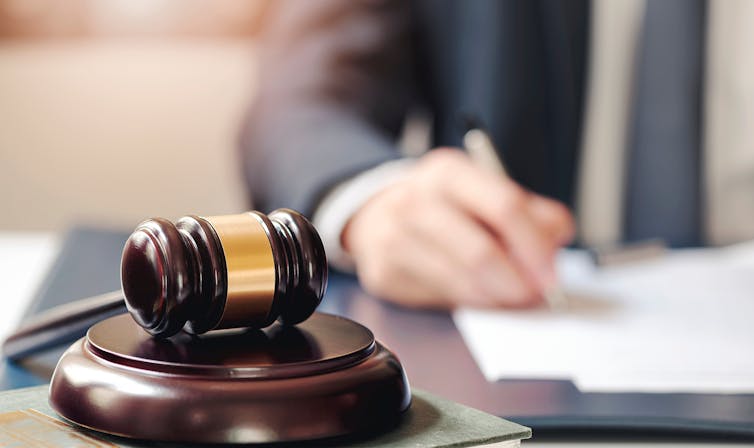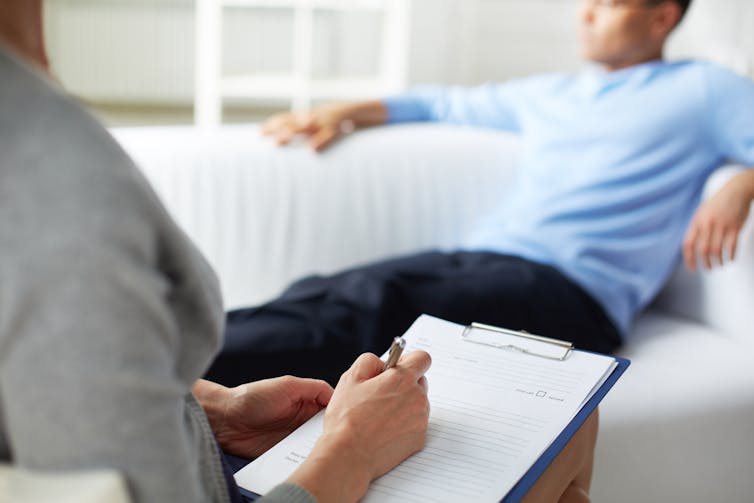Criminal lawyers are regularly exposed to trauma — how can NZ's justice system look after them better?
- Written by Yvette Tinsley, Professor of Law, Te Herenga Waka — Victoria University of Wellington
As many court visitors or news consumers will know, criminal law can be a mix of often horrific detail and seemingly dry procedure.
Our current system, based in large part on the English adversarial process, embraces notions of the rational and dispassionate nature of law. There is an expectation the criminal courts will take an objective – almost clinical – approach to the human condition.
Yet despite this reputation for objectivity, in reality the criminal law is steeped in emotion. Historically, moral concerns have been instrumental in deciding what behaviours we criminalise. Criminal cases – certainly those that are not minor – often document painful times in people’s lives.
This all means that criminal lawyers are regularly exposed to traumatic material and emotions. Their job requires them to work with graphic evidence and distressing testimony, from which they are expected to emotionally detach. And all with the knowledge that case outcomes will significantly affect the lives of complainants, defendants, their whānau and communities.
But over the past two years, there has been much talk of the need for transformative change[1] of the criminal justice process. And the experience of criminal lawyers is surely a key factor in calls for greater humanisation[2] of the criminal law as part of the ongoing reform process.
 The criminal law strives to be rational and dispassionate, but ‘trauma is everywhere’.
Shutterstock
The criminal law strives to be rational and dispassionate, but ‘trauma is everywhere’.
Shutterstock
The impact of working in criminal law
We know lawyers as a group are at higher risk of poor mental health[3] as well as occupational stress and burnout[4]. Yet there has been little research – and until now none based in New Zealand – that has qualitatively examined whether (and how) criminal lawyers’ work affects their emotional and psychological well-being.
There is even less research examining what we might do to address any negative outcomes for lawyers themselves and for the system as a whole.
Read more: The legal profession has a mental health problem – which is an issue for everyone[5]
We are in the early stages of a project that hopes to provide an evidence base about emotional impact, vicarious trauma and well-being in the criminal courts. Our research aims to be a first step in understanding more about the impacts of working in the criminal law, in the hope of better supporting the profession and students entering it.
In the process, we want to increase understanding about how criminal lawyers try to preserve their own well-being, what methods are successful, and how they might manage emotions positively to improve their experience and outcomes at work.
 Criminal lawyers are rarely offered professional debriefing or support by a psychologist.
Shutterstock
Criminal lawyers are rarely offered professional debriefing or support by a psychologist.
Shutterstock
‘Trauma is everywhere’
Under the umbrella of the project, one of our researchers has looked at the experiences of Crown prosecutors, who are exposed to some of the most violent and harmful criminal offending.
Prosecutors described several types of traumatic material and the emotional consequences, observing that “trauma is everywhere”. Written, visual and aural exposure to traumatic material is the norm, but face-to-face meetings with complainants are understandably the most difficult for prosecutors to manage and distance themselves from.
Prosecutors have a profound sense of responsibility for case outcomes and for larger problems of the criminal justice process, including over-representation of Māori as defendants and complainants. They feel professional inadequacy and guilt if they don’t secure convictions. They experience difficulties in dealing with cases that mirror their own personal trauma or have personal significance for them or their whānau.
Read more: Despair and depression at law school are real, and need attention[6]
It was common for the prosecutors interviewed to report an inability to sleep, an increased sense of concern for the safety of themselves and their loved ones, and limited emotional capacity for personal relationships.
Prosecutors told us about coping mechanisms they use to help them maintain professionalism, such as setting emotional boundaries, creating a courtroom persona to ensure they do not show emotion, and even aspiring to become desensitised.
Good working relationships and self-care help protect their well-being. But what prosecutors told us about the pressures of their work, self-criticism and workplace culture all suggest much more needs to be done to address the impacts of working in the criminal law.
Read more: The law is a man's world. Unless the culture changes, women will continue to be talked over, marginalised and harassed[7]
A safer process for all
Unlike other professions dealing with human trauma, criminal lawyers are very rarely offered professional debriefing or support by a psychologist. Different institutional and professional care needs to be explored, as do ways to prepare those entering the profession for the reality of criminal justice work.
To produce a robust set of findings that reflect the experiences of both prosecutors and defence counsel, we’re expanding the research we’ve already done by conducting further interviews over the coming months.
From this, we hope to make recommendations about changes that could be made in the profession and to its support structures. And from there, to consider the experiences of other criminal justice professionals, especially those who work in the criminal courts.
Criminal law is a profession whose inner workings remain largely invisible, until a high-profile case makes headlines. But maintaining a healthy workforce is integral to a responsive and safe criminal process for all.
If you are a legal professional working in the New Zealand criminal courts and would like to participate in this research, contact Yvette.Tinsley@vuw.ac.nz[8], Nichola.Tyler@vuw.ac.nz[9], or visit the Firesetting and Forensic Mental Health Lab[10] for more information.
References
- ^ the need for transformative change (www.justice.govt.nz)
- ^ calls for greater humanisation (www.youtube.com)
- ^ poor mental health (www.lawsociety.org.nz)
- ^ occupational stress and burnout (www.stuff.co.nz)
- ^ The legal profession has a mental health problem – which is an issue for everyone (theconversation.com)
- ^ Despair and depression at law school are real, and need attention (theconversation.com)
- ^ The law is a man's world. Unless the culture changes, women will continue to be talked over, marginalised and harassed (theconversation.com)
- ^ Yvette.Tinsley@vuw.ac.nz (theconversation.com)
- ^ Nichola.Tyler@vuw.ac.nz (theconversation.com)
- ^ Firesetting and Forensic Mental Health Lab (ffmhlab.wordpress.com)

















